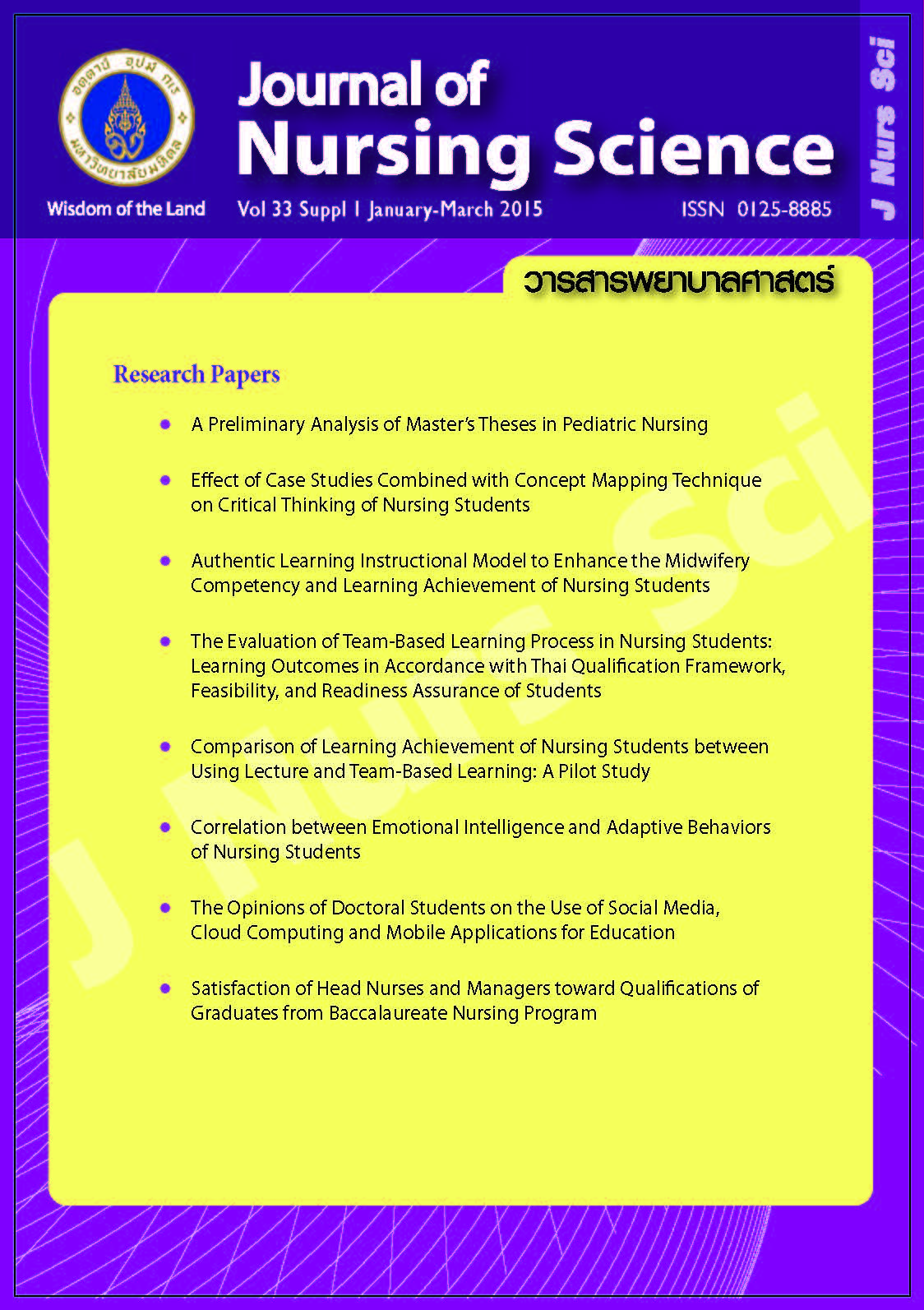Correlation between Emotional Intelligence and Adaptive Behaviors of Nursing Students
Main Article Content
Abstract
Purpose: The objectives of this study were to: 1) explore emotional intelligence of nursing students from the 1st to 4th academic years; 2) compare adaptive behaviors in nursing student roles from the 1st to the 4th academic years, and compare adaptive behaviors in nursing practicum between the 3rd year and the 4th year nursing students; 3) examine the correlation of emotional intelligence and adaptive behaviors in nursing student roles and adaptive behaviors in nursing practicum of nursing students.
Design: Correlational research.
Methods: The sample consisted of 262 of 1st- 4th year nursing students, with 126 students in the 3rd and the 4th academic years. Data were collected by using the Emotional Intelligence Screening Test for the Thai Population of the Department of Mental Health, and adaptive behaviors in nursing student roles and nursing practicum questionnaires. Data were analyzed by percentage, mean, standard deviation, One-way analysis of variance and Pearson’s correlation.
Main findings: The results revealed that: 1) the mean scores of emotional intelligence of 1st- 4th year nursing students were in normal levels; 2) the adaptive behaviors in nursing students roles from the 1st to the 4th academic year were not significantly different (p >.05), and the adaptive behaviors in nursing practicum of nursing students from the 3rd to the 4th academic year were not significantly different (p > .05); 3) the total score of emotional intelligence and the three sub-scale scores of emotional intelligence (virtue, competence, and happiness) were significantly correlated with adaptive behaviors in nursing student roles (r = .520, .417, .501, .451, p < .001 respectively) and with adaptive behaviors in nursing practicum (r = .459, .265, .315, .355, p < .001 respectively).
Conclusion and recommendations: The results suggest that student development unit and educational management unit should work collaboratively in the development of emotional intelligence in order to promote adaptive behaviors in nursing student roles and adaptive behaviors in nursing practicum.
ความสัมพันธ์ระหว่างความฉลาดทางอารมณ์กับพฤติกรรมการปรับตัวของนักศึกษาพยาบาล
บทคัดย่อ
วัตถุประสงค์: เพื่อศึกษา 1) ความฉลาดทางอารมณ์ของนักศึกษาพยาบาลชั้นปีที่ 1 ถึงชั้นปีที่ 4, 2) เปรียบเทียบพฤติกรรมการปรับตัวตามบทบาทการเป็นนักศึกษาพยาบาลระหว่างชั้นปีที่ 1 ถึง ชั้นปีที่ 4และเปรียบเทียบพฤติกรรมการปรับตัวในการเรียนภาคปฏิบัติของนักศึกษาพยาบาลระหว่างชั้นปีที่ 3 และชั้นปีที่ 4, 3) ศึกษาความสัมพันธ์ระหว่างความฉลาดทางอารมณ์กับพฤติกรรมการปรับตัวตามบทบาทการเป็นนักศึกษาพยาบาล และพฤติกรรมการปรับตัวในการเรียนภาคปฏิบัติของนักศึกษาพยาบาล
รูปแบบการวิจัย: การวิจัยเชิงสหสัมพันธ์
วิธีดำเนินการวิจัย: กลุ่มตัวอย่างคือ นักศึกษาหลักสูตรพยาบาลศาสตรบัณฑิตชั้นปีที่ 1 ถึงชั้นปีที่ 4 จำนวน 262 คน ซึ่งมีชั้นปีที่ 3 และ 4 จำนวน 126 คนเก็บรวบรวมข้อมูลโดยใช้แบบวัดความฉลาดทางอารมณ์ของกรมสุขภาพจิต และแบบสอบถามพฤติกรรมการปรับตัว วิเคราะห์ข้อมูลโดยหาค่าร้อยละ ค่าเฉลี่ย ค่าเบี่ยงเบนมาตรฐาน วิเคราะห์ความแปรปรวนทางเดียวและสัมประสิทธิ์สหสัมพันธ์ของเพียร์สัน
ผลการวิจัย: พบว่า 1) นักศึกษาพยาบาลชั้นปีที่ 1-4 มีคะแนนเฉลี่ยความฉลาดทางอารมณ์อยู่ระดับปกติ 2) นักศึกษาพยาบาลชั้นปีที่ 1-4 มีการปรับตัวตามบทบาทการเป็นนักศึกษาไม่แตกต่างกัน (p > .05) และนักศึกษาพยาบาลชั้นปีที่ 3 และ 4 มีพฤติกรรมการปรับตัวในการเรียนภาคปฏิบัติไม่แตกต่างกัน 3) คะแนนความฉลาดทางอารมณ์โดยรวมและตามรายด้านเก่ง ดี มีสุข มีความสัมพันธ์กับคะแนนพฤติกรรมการปรับตัวตามบทบาทการเป็นนักศึกษาอย่างมีนัยสำคัญทางสถิติ (r = .520, .417, .501, .451; p < .001 ตามลำดับ) และมีความสัมพันธ์กับพฤติกรรมการปรับตัวในการเรียนภาคปฏิบัติอย่างมีนัยสำคัญทางสถิติ (r = .459, .265, .315, .355; p < .001 ตามลำดับ)
สรุปและข้อเสนอแนะ: ฝ่ายพัฒนานักศึกษาและฝ่ายจัดการศึกษาควรประสานความร่วมมือในการพัฒนาความฉลาดทางอารมณ์ให้กับนักศึกษาพยาบาลเพื่อส่งเสริมพฤติกรรมการปรับตัวตามบทบาทนักศึกษากับพฤติกรรมการปรับตัวในการเรียนภาคปฏิบัติ
คำสำคัญ: ความฉลาดทางอารมณ์ พฤติกรรมการปรับตัว บทบาทการเป็นนักศึกษา การเรียนภาคปฏิบัติ
Article Details
Copyright Notice: Nursing Science Journal of Thailand has exclusive rights to publish and distribute the manuscript and all contents therein. Without the journal’s permission, the dissemination of the manuscript in another journal or online, and the reproduction of the manuscript for non-educational purpose are prohibited.

Disclaimer: The opinion expressed and figures provided in this journal, NSJT, are the sole responsibility of the authors. The editorial board bears no responsibility in this regard.


